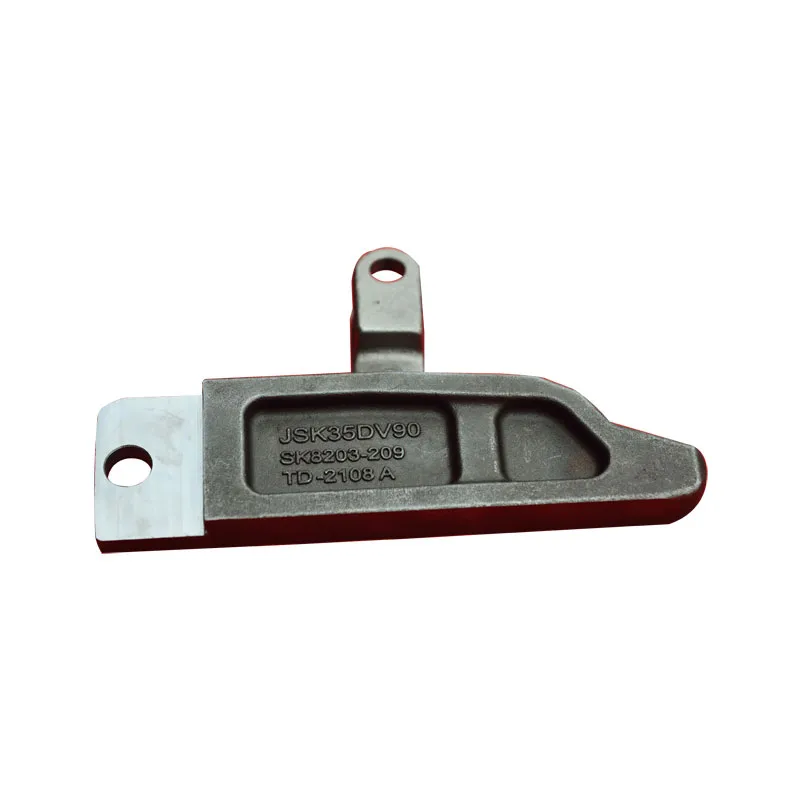Locking Hook Forgings: Why They Are Essential for Heavy-Duty Operations
2024-11-28
When it comes to lifting and securing heavy loads, safety and reliability are not just important—they’re crucial. Locking hook forgings are designed to provide secure connections in high-stress environments, where traditional hooks might fail. These specialized hooks are essential in a variety of industrial settings, offering an automatic locking feature that ensures connections remain intact, even under extreme loads. In this blog, we’ll explore the role of locking hook forgings in heavy-duty operations and why they’re a critical component in industries like construction, transportation, and marine logistics.
The Importance of Locking Hook Forgings in Heavy-Duty Operations
Locking hook forgings are a class of mechanical hooks used to connect lifting chains, slings, or ropes to heavy loads. They are forged from strong, durable materials such as carbon steel or stainless steel, ensuring that they can handle substantial weight without breaking or bending. Unlike traditional hooks that may require safety pins or manual locking mechanisms, locking hook forgings automatically lock into place once engaged, offering an added level of security.
This built-in locking mechanism is particularly useful in operations where the consequences of accidental disconnection can be catastrophic. For example, in construction, a disengaged hook could lead to fallen materials, while in marine operations, it could result in lost cargo or damage to equipment. By providing a reliable, automatic means of securing loads, locking hook forgings significantly reduce these risks.
How Locking Hook Forgings Work
The locking mechanism in these forgings typically involves a spring-loaded latch or pin that engages once the hook has been connected to another component. Once engaged, the latch prevents the hook from detaching, even when subjected to significant force or motion. This mechanism is designed to function automatically, ensuring that operators don’t need to worry about manually securing the hook during operation.
Locking hook forgings are available in a wide range of sizes and configurations, making them adaptable to various lifting and towing applications. Whether it’s a small agricultural machine or a large crane hoisting building materials, locking hook forgings can be tailored to the specific needs of the operation.
Common Applications for Locking Hook Forgings
1. Construction Lifting and Rigging:
In the construction industry, locking hook forgings are used extensively in cranes, hoists, and other lifting equipment to secure heavy loads like steel beams, concrete blocks, and construction materials. Their ability to automatically lock and secure materials during lifting ensures that construction projects progress smoothly and safely.
2. Marine Transport and Offshore Operations:
In marine and offshore environments, locking hook forgings are crucial for securing cargo, anchor lines, and towing cables. The corrosive nature of saltwater and the harsh weather conditions make reliable, rust-resistant locking hook forgings essential to prevent cargo from shifting or detaching during transport.
3. Heavy-Duty Towing:
Towing large vehicles, machinery, or equipment often requires robust and secure connections. Locking hook forgings are used to attach towing chains or cables to vehicles, ensuring that even under heavy stress, the connection remains intact. Their locking mechanism prevents accidental detachment during towing operations, ensuring safety.
4. Agricultural Machinery:
In agriculture, locking hook forgings are used to connect trailers, carts, and other equipment to tractors and other vehicles. The secure connection provided by locking hooks ensures that heavy agricultural loads are safely transported without the risk of detachment.
Advantages of Locking Hook Forgings
1. Improved Safety:
The automatic locking feature is a key benefit of locking hook forgings. By ensuring that hooks remain securely fastened during use, these hooks reduce the likelihood of accidents caused by accidental detachment, protecting workers and preventing damage to equipment.
2. Enhanced Efficiency:
Locking hook forgings allow for quicker and more efficient setup compared to traditional hooks that require manual locking or safety pins. This time-saving feature is crucial in industries where speed is essential, such as construction or shipping.
3. Cost-Effectiveness:
While locking hook forgings may have a higher upfront cost than regular hooks, their durability and reliability reduce the need for frequent replacements. This makes them a more cost-effective solution over the long term, especially in industries that rely on heavy lifting and towing.
Locking hook forgings are a vital component in industries that require reliable, secure connections for heavy-duty lifting and towing. Their robust design, automatic locking feature, and ability to handle extreme loads make them indispensable in fields like construction, marine logistics, and agriculture. By investing in high-quality locking hook forgings, industries can improve safety, efficiency, and cost-effectiveness, ensuring smooth and successful operations.



